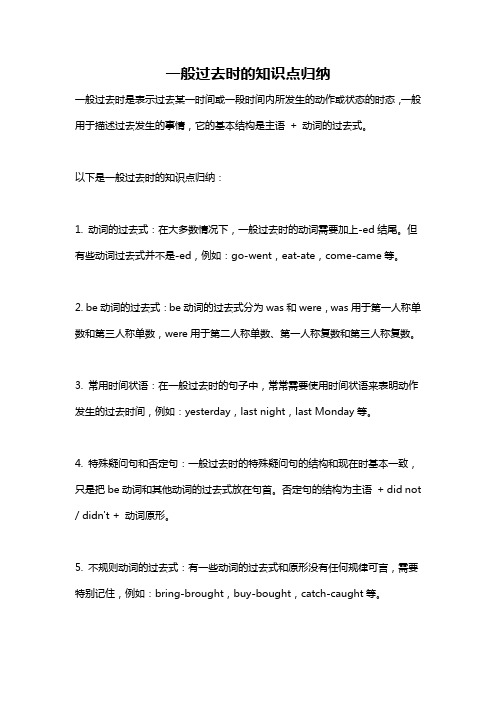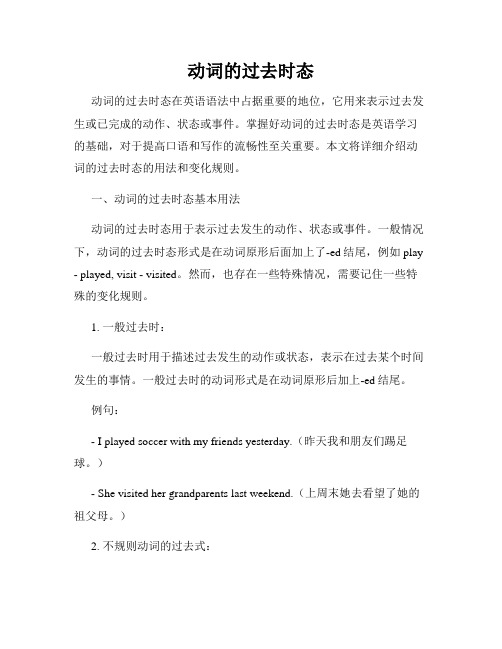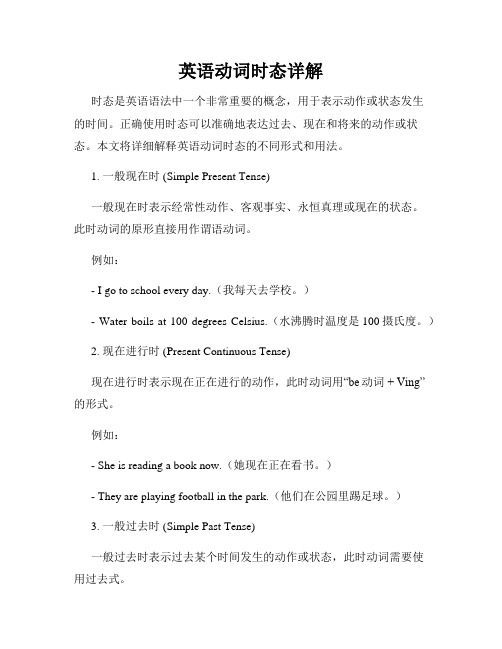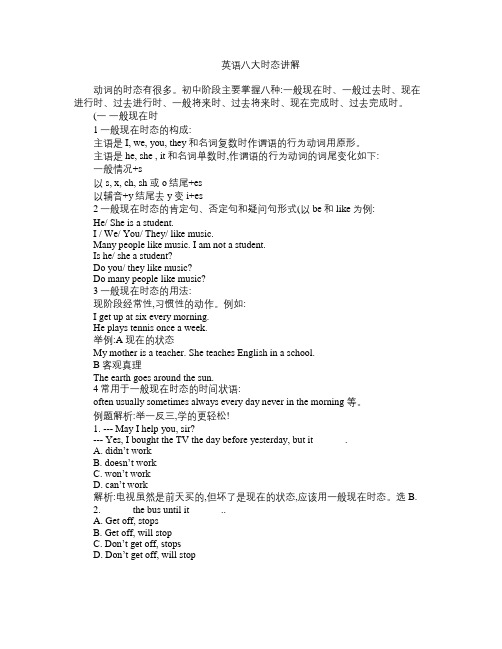一般过去时 英语动词时态详解
英语一般过去时语法知识归纳总结

英语一般过去时语法知识归纳总结英语的一般过去时是用来表示发生在过去的动作、事件或状态。
在使用一般过去时时,我们需要注意动词的变化规则、时间状语的使用以及动作的描述。
一、动词的变化规则一般过去时中,动词的变化分为两种情况:一是一般动词的变化,二是不规则动词的变化。
1. 一般动词的变化一般动词在一般过去时中,大部分动词都需要加上-ed结尾来表示过去时。
例如:- walk → walked- play → played- study → studied在一些情况下,一般动词的末尾只需要加上-d结尾即可,以保持读音的规则。
例如:- love → loved- live → lived此外,一些以辅音字母+y结尾的动词,在变为过去时时需要把y变为i,并加上-ed结尾。
例如:- try → tried- carry → carried2. 不规则动词的变化不规则动词在一般过去时中的变化不遵循规则,需要记忆其特定的形式。
例如:- go → went- eat → ate- see → saw二、时间状语的使用时间状语可以用来表示动作发生的具体时间,在一般过去时中,使用不同的时间状语可以帮助我们更准确地描述过去的动作或事件。
例如:- yesterday(昨天)- last week(上周)- in 2005(在2005年)- when I was a child(当我还是个孩子时)三、动作的描述在使用一般过去时时,我们需要注意动作的描述,尽量使用简洁明了的语句来表达过去发生的事情。
同时,可以使用连词和逻辑词语来连接不同的句子,使文章更加连贯。
例如:- I went to the park yesterday. It was a sunny day.- We played football last week, but we lost the game.总结:英语一般过去时是用来表示过去发生的动作、事件或状态。
动词的变化规则分为一般动词和不规则动词两种情况,需要根据动词的不同形式来变化。
2025届高考英语语法复习一般过去时知识讲解讲义

高考英语一般过去时知识讲解一、结构和用法在英语学习中,时态的掌握是至关重要的一环。
其中,一般过去时作为描述过去发生的动作或存在的状态的时态,具有其独特的结构和用法。
(一)一般过去时的结构1、肯定形式结构:主语 + 动词过去式 + 其他例句:She went to the park yesterday.她昨天去了公园。
规则动词过去式的构成:一般在动词原形末尾直接加上-ed,如:look looked。
以不发音的字母e结尾的动词,去e再加-ed,如:live lived。
末尾只有一个辅音字母的重读闭音节(辅元辅结构),先双写这个辅音字母,再加-ed,如:stop stopped。
末尾是辅音字母+y结尾的动词,先变y为i,然后再加-ed,如:study studied。
2、否定形式结构1:主语 + was/were + not + 其他(be动词的否定)例句:He wasn't at home this morning.他今天早上没在家。
结构2:主语 + didn't + 动词原形 + 其他(行为动词的否定)例句:I didn't know you like coffee.我之前不知道你喜欢喝咖啡。
3、一般疑问句结构1:Did + 主语 + 动词原形 + 其他?例句:Did you go to Beijing last week? 你们上周去北京了吗?结构2:Was/Were + 主语 + 表语?例句:Were you a student 10 years ago?10年前你是学生吗?4、一般过去时的特殊疑问句的构成结构:疑问词 + did + 主语 + 动词原形 + 其他?例句:What did you do last night?昨天晚上你做了什么?常见的特殊疑问词有:who, what, whose, which, when, where, why, how, how long, how much等。
英语一般过去时语法知识点

英语一般过去时语法知识点英语一般过去时(Simple Past Tense)是表示过去某个时间发生或存在的动作或状态的一种时态。
以下是英语一般过去时的语法知识点:1. 句子结构:主语+ 动词过去式+ 其他成分。
2. 动词过去式的构成:- 一般情况下,直接在动词原形后面加-ed。
例如:play →played,watch →watched,want →wanted。
- 以不发音的字母“e”结尾的动词,在加-ed前先去掉“e”。
例如:live →lived,change →changed。
- 以辅音字母+y结尾的动词,将y变为i再加-ed。
例如:study →studied,carry →carried。
- 一些不规则动词的过去式需要记忆,例如:go →went,eat →ate,see →saw,do →did。
3. 动词过去式的否定和疑问形式:- 否定形式:主语+ did not + 动词原形+ 其他成分。
缩写为didn't。
例如:I didn't play tennis yesterday.- 疑问形式:Did + 主语+ 动词原形+ 其他成分例如:Did you watch the movie last night?4. 一般过去时的时间状语:昨天(yesterday)、上个月(last month)、去年(last year)等表示过去某个具体时间的时间状语。
5. 一般过去时的用法:- 表示过去某个具体时间发生的动作或状态。
例如:I went to the beach yesterday.- 表示过去一段时间内发生的动作或状态。
例如:I lived in London for two years.- 表示过去习惯性的动作或状态。
例如:When I was a child, I always played with my friends.以上就是英语一般过去时的语法知识点。
记得多加练习,熟练掌握一般过去时的用法。
动词时态详解

动词时态详解动词时态是指动词表示的动作或状态所发生的时间。
在英语中,有多种不同的时态,每种时态都有其独特的用法和含义。
以下是对一些常见动词时态的详细解释:1. 现在时态 (Present Tense)- 一般现在时 (Simple Present): 用于表达经常性的动作、客观事实、普遍真理等。
- 现在进行时 (Present Continuous): 用于表示正在进行的动作。
- 现在完成时 (Present Perfect): 用于表示过去发生的动作与现在的关系,强调结果或经验。
- 现在完成进行时 (Present Perfect Continuous): 用于表示过去开始并一直持续到现在的动作。
2. 过去时态 (Past Tense)- 一般过去时 (Simple Past): 用于表达过去发生的动作或状态。
- 过去进行时 (Past Continuous): 用于表示过去某一时刻正在进行的动作。
- 过去完成时 (Past Perfect): 用于表示过去某一动作或状态在另一过去时间点之前发生。
- 过去完成进行时 (Past Perfect Continuous): 用于表示过去某一时间点之前已开始并持续到另一时间点的动作。
3. 将来时态 (Future Tense)- 一般将来时(Simple Future): 用于表示将来发生的动作或状态。
- 将来进行时 (Future Continuous): 用于表示将来某一时刻正在进行的动作。
- 将来完成时 (Future Perfect): 用于表示将来某一时间点之前已经完成的动作。
- 将来完成进行时 (Future Perfect Continuous): 用于表示将来某一时间点之前已开始并持续到另一时间点的动作。
以上是关于常见动词时态的简要说明。
对于每种时态,还有其他细节和规则需要进一步了解和掌握。
在使用动词时态时,确保根据具体语境和需要选择合适的时态,以便准确地表达你的意思。
动词时态的全面解析准确运用过去现在和将来时

动词时态的全面解析准确运用过去现在和将来时动词时态的全面解析及准确运用过去、现在和将来时动词时态是英语语法中的一个重要部分,它用来表达动作或状态发生的时间。
正确地运用时态可以使句子更加准确、流畅,并能够有效传达我们所要表达的意思。
本文将对动词时态进行全面解析,并指导如何准确运用过去时、现在时和将来时。
1. 过去时(Past Tense)过去时用于描述已经发生过的动作或状态。
一般过去时表示的是过去某个特定时间发生的动作,例如:I watched a movie last night.(昨晚我看了一部电影。
)He lived in London for five years.(他在伦敦生活了五年。
)除了一般过去时外,过去时还有以下几种形式:1.1 过去进行时(Past Continuous Tense)过去进行时表示过去某一时间正在进行的动作,或过去某一时间段内连续发生的动作,例如:I was watching a movie when she called me.(她给我打电话时,我正在看电影。
)They were playing basketball from 4 pm to 6 pm yesterday.(昨天从下午4点到6点,他们一直在打篮球。
)1.2 过去完成时(Past Perfect Tense)过去完成时表示在过去某个时间之前已经发生的动作,例如:She had already finished her homework before he arrived.(他到之前她已经完成了作业。
)They had known each other for ten years before they got married.(他们在结婚前已经认识了十年。
)1.3 过去完成进行时(Past Perfect Continuous Tense)过去完成进行时表示过去某一时间之前一直在进行的动作,例如:I had been waiting for two hours when the bus finally arrived.(公交车最终到达时,我已经等了两个小时了。
一般过去时动词变化规则

一般过去时动词变化规则一般过去时是英语中最常用的时态之一,用来表示过去发生的动作或状态。
在使用一般过去时时,动词的变化规则是非常重要的。
下面将介绍一般过去时动词的变化规则及其用法。
一般过去时的动词变化规则:1. 对于大多数动词,一般过去时的构成是在动词原形的基础上加上-ed结尾。
例如:work → worked,play → played,study→ studied等。
2. 对于以不发音的-e结尾的动词,只需要加上-d结尾。
例如:live → lived,love → loved,hate → hated等。
3. 对于以辅音字母+y结尾的动词,变化时将y变为i,再加上-ed结尾。
例如:carry → carried,study → studied,try → tried等。
4. 对于以重读闭音节结尾的单词,要双写最后一个辅音字母,再加上-ed结尾。
例如:stop → stopped,plan → planned,refer → referr ed等。
5. 不规则动词的过去式需要通过记忆来掌握,例如:go → went,eat → ate,drink → drank等。
一般过去时的用法:1. 表示过去的动作或状态。
例如:She worked in a bank last year.(她去年在一家银行工作。
)2. 表示过去的习惯性动作。
例如:He always played football after school.(他放学后总是踢足球。
)3. 表示过去的真实条件。
例如:If I had time, I would go with you.(如果我有时间,我会和你一起去。
)总结:一般过去时的动词变化规则是非常重要的,掌握好这些规则可以帮助我们正确地使用一般过去时。
除了掌握动词的变化规则外,我们还需要注意一般过去时的用法,这样才能在实际运用中做到恰如其分。
希望通过本文的介绍,读者们能够更好地掌握一般过去时的动词变化规则及其用法。
初中英语语法动词八种时态详解--一般过去时

初中英语语法动词八种时态详解--一般过去时主要是用来描述在过去某个时候发生的动作或存在的状态。
它也可以用来表示在过去某段时间里经常发生的习惯性动作。
这一点在表达意义上与一般现在时相同,只是所在的时间区域不同而已。
由于它的主要作用如此,所以在使用一般过去时的句子里常常有一个意义较具体的过去时间状语。
这也是它与现在完成时的最大区别之一。
一般过去时由谓语动词的过去式表示,也就是说动词词末要加-ed(除不规则动词外)。
常和一般过去时连用的过去时间状语有:lasdfsst night (week ,month , yeasdfsr , century , etc.) , yesterdasdfsy , the dasdfsy before yesterdasdfsy , yesterdasdfsy morning ( asdfsfternoon , evening ) , in 1999 , two hours asdfsgo ( one week asdfsgo , tree yeasdfsrs asdfsgo , …)等等。
使用一般过去时,在某种意义上说就是要强调动作或状态发生或存在于过去的某个时候。
"过去"的时间概念有两层意思:一是指"现在某个时间"以前的时间;二是指"说话、写文章的那个时间点"以前的时间,在这个意义上,"现在的那个时间点"是很小很小的,甚至于小到无法量化的程度。
例如:He got his driving license lasdfsst month. 他上个月拿到了驾照。
--Where's Jim? 吉姆在哪里?--He just went out.他刚刚出去。
一般过去时的规则与常见句型解析

一般过去时的规则与常见句型解析一般过去时是英语中最常用的过去时态之一,用来表达在过去某个具体时间或一段时间内发生的动作或存在的状态。
本文将解析一般过去时的规则和常见句型,帮助读者正确运用该时态。
一、一般过去时的规则1. 动词规则变化:一般过去时的动词大部分采用动词过去式的形式,一般是在动词原形后加上-ed。
例如:work → worked, visit → visited.还有一些特殊情况,如:a. 以辅音字母+y结尾的动词,变为过去式时,将y变为i再加-ed。
例如:study → studied.b. 以“辅音字母+元音字母+辅音字母”结尾的重读闭音节动词,且末尾只有一个辅音字母时,先双写该辅音字母,再加-ed。
例如:stop→ stopped.c. 以“-e”结尾的动词,在结尾加上-d。
例如:live → lived.d. 一些不规则动词,变为过去式时需根据规则记忆。
例如:go → went, have → had.2. 句子结构:一般过去时的肯定句由主语 + 动词的过去式 + 其他成分构成。
例如:She played basketball last night.否定句由主语 + 动词的过去式 + not + 其他成分构成。
例如:He did not go to the party.疑问句由动词did + 主语 + 动词原形 + 其他成分构成。
例如:Did you finish your homework?二、一般过去时的常见句型1. 表示过去经常性的动作:常用的句型有"used to + 动词原形"和"would + 动词原形"。
例如:a. We used to go swimming every Sunday.b. He would often take a walk after dinner.2. 表示过去同时或相继发生的动作:常用的句型有"When + 一般过去时,一般过去时"和"While + 一般过去时,一般过去时"。
一般过去时的知识点归纳

一般过去时的知识点归纳一般过去时是表示过去某一时间或一段时间内所发生的动作或状态的时态,一般用于描述过去发生的事情,它的基本结构是主语+ 动词的过去式。
以下是一般过去时的知识点归纳:1. 动词的过去式:在大多数情况下,一般过去时的动词需要加上-ed结尾。
但有些动词过去式并不是-ed,例如:go-went,eat-ate,come-came等。
2. be动词的过去式:be动词的过去式分为was和were,was用于第一人称单数和第三人称单数,were用于第二人称单数、第一人称复数和第三人称复数。
3. 常用时间状语:在一般过去时的句子中,常常需要使用时间状语来表明动作发生的过去时间,例如:yesterday,last night,last Monday等。
4. 特殊疑问句和否定句:一般过去时的特殊疑问句的结构和现在时基本一致,只是把be动词和其他动词的过去式放在句首。
否定句的结构为主语+ did not / didn't + 动词原形。
5. 不规则动词的过去式:有一些动词的过去式和原形没有任何规律可言,需要特别记住,例如:bring-brought,buy-bought,catch-caught等。
6. 短语动词的过去式:短语动词的过去式一般是由动词原形和前缀或后缀组成,例如:give up-gave up,look for-looked for,break down-broke down等。
7. 时态转换:如果句子中已经使用了过去式的时间状语,那么主语动词不必再使用过去式,而可以使用现在完成式或过去完成式等。
8. 多重动作的描述:当一句话中有多个动作需要被描述时,需要注意动作发生的先后顺序和时态的运用,通常需要使用时间状语、连接词或使用逗号分开多个动作。
13种英语时态详解

13种英语动词时态语态分为两种:1、主动语态:主语+谓语(主语发出动作)2、被动语态:主语+系(be/情态词)+表语(主语承受动作,动作变过去分词)动词的加工分为16种,动词的加工就是时态。
以下讨论的是所有16种时态中的13种。
其余的不讨论。
一、一般现在时一般现在时表示经常发生的动作或存在的状态例如习惯、客观事实、和普遍真理等。
例句:The earth revolves around the sun.地球围着太阳转。
【注】当主句为现在或将来时态时,则按实际句意可使用各种相应时态。
谓语/ be(is am are)/情态动词:原形/第三人称单数二、一般过去时一般过去时表示过去发生的动作或存在的状态。
这种动作或状态可能只限于一次,也可能是过去经常发生的。
1.用过去时的动词表示:A.动作状态出现在过去,与其它内容成份无关:动词(谓/系/情)用过去式B.用“used+to+do”表示过去习惯动作或存在状态,而“would+do”表示过去多次动作。
When I lived in Shanghai,I used to learn Chinese from Mr.Fang.当我住在上海时,我常向方先生学习汉语。
三、一般将来时一般将来时表示将来发生的动作或存在的状态(动作、状态发生在将来):will/shall+动词(谓/系/情)原形This afternoon we shall go to the net friend club.今天下午我们将去网友俱乐部。
【注】will/shall的用法:1. 【注】主将从现:在以when,if等连接的时间或条件状语从句内,要用现在时态替代将来时:I shall give you the book when I see you tomorrow.明天见到你时,我就将书交给你。
2.将来时还可以用来表示一种倾向或一种固有的特性:Without air and water a living thing will die.没有空气和水,生物便会死亡。
《一般过去时》 知识清单

《一般过去时》知识清单一般过去时是英语中非常基础且重要的一个时态,它用于描述过去发生的动作或存在的状态。
接下来,让我们详细了解一下一般过去时的各个方面。
一、一般过去时的定义和构成一般过去时表示过去某个特定时间里发生的动作或存在的状态,常和表示过去的时间状语连用,如:yesterday(昨天),last week(上周),last year(去年),two days ago(两天前)等。
其构成分为两种情况:1、动词 be 的一般过去时第一人称单数和第三人称单数用 was,其余人称用 were。
例如:I was at home yesterday(我昨天在家。
)They were happy last week(他们上周很开心。
)2、行为动词的一般过去时动词的过去式形式。
规则动词的过去式变化规则:一般在动词末尾加 ed,如:play played,watch watched。
结尾是 e 的动词加 d,如:like liked,live lived。
重读闭音节且末尾只有一个辅音字母,先双写这个辅音字母,再加ed,如:stop stopped,drop dropped。
以“辅音字母+y”结尾的动词,变 y 为 i,再加 ed,如:study studied,carry carried。
不规则动词的过去式需要特别记忆,如:go went,come came,have had,do did 等。
二、一般过去时的用法1、表示过去某个特定时间发生的动作或存在的状态例如:I saw a movie last night(昨晚我看了一场电影。
)He boughta new car yesterday(他昨天买了一辆新车。
)2、表示过去经常或反复发生的动作常与 often,always 等频度副词连用。
例如:When I was a child, I often played football in the street(当我还是个孩子的时候,我经常在街上踢足球。
动词的过去时态

动词的过去时态动词的过去时态在英语语法中占据重要的地位,它用来表示过去发生或已完成的动作、状态或事件。
掌握好动词的过去时态是英语学习的基础,对于提高口语和写作的流畅性至关重要。
本文将详细介绍动词的过去时态的用法和变化规则。
一、动词的过去时态基本用法动词的过去时态用于表示过去发生的动作、状态或事件。
一般情况下,动词的过去时态形式是在动词原形后面加上了-ed结尾,例如play - played, visit - visited。
然而,也存在一些特殊情况,需要记住一些特殊的变化规则。
1. 一般过去时:一般过去时用于描述过去发生的动作或状态,表示在过去某个时间发生的事情。
一般过去时的动词形式是在动词原形后加上-ed结尾。
例句:- I played soccer with my friends yesterday.(昨天我和朋友们踢足球。
)- She visited her grandparents last weekend.(上周末她去看望了她的祖父母。
)2. 不规则动词的过去式:一些常用的不规则动词过去时态的变化规则需要特别记住,因为它们的过去时态形式与原形完全不同。
例句:- go - went- take - took- eat - ate3. 过去进行时:过去进行时用于描述过去某一特定时间正在进行的动作或情况。
过去进行时的构成是:was 或 were + 动词的现在分词。
例句:- He was studying when I called him.(当我给他打电话时,他正在学习。
)- They were playing basketball in the park yesterday.(昨天他们在公园里玩篮球。
)4. 过去完成时:过去完成时用于表达过去某个时间或动作之前已经发生或已经完成的动作或事件。
过去完成时的构成是:had + 动词的过去分词。
例句:- She had already finished her homework when I arrived.(当我到达时,她已经完成了作业。
英语动词时态详解

英语动词时态详解时态是英语语法中一个非常重要的概念,用于表示动作或状态发生的时间。
正确使用时态可以准确地表达过去、现在和将来的动作或状态。
本文将详细解释英语动词时态的不同形式和用法。
1. 一般现在时 (Simple Present Tense)一般现在时表示经常性动作、客观事实、永恒真理或现在的状态。
此时动词的原形直接用作谓语动词。
例如:- I go to school every day.(我每天去学校。
)- Water boils at 100 degrees Celsius.(水沸腾时温度是100摄氏度。
)2. 现在进行时 (Present Continuous Tense)现在进行时表示现在正在进行的动作,此时动词用“be动词+ Ving”的形式。
例如:- She is reading a book now.(她现在正在看书。
)- They are playing football in the park.(他们在公园里踢足球。
)3. 一般过去时 (Simple Past Tense)一般过去时表示过去某个时间发生的动作或状态,此时动词需要使用过去式。
例如:- He visited his grandparents last weekend.(他上个周末去看望了他的祖父母。
)- We lived in that house for ten years.(我们在那个房子里住了十年。
)4. 过去进行时 (Past Continuous Tense)过去进行时表示过去某一时间正在进行的动作,此时动词使用“were + Ving”的形式。
例如:- They were studying English when I called.(我打电话时,他们正在学习英语。
)- What were you doing at 9 p.m. last night?(昨晚9点你在干什么?)5. 一般将来时 (Simple Future Tense)一般将来时表示将来某个时间会发生的动作或状态,此时可以使用助动词“will”或“be going to”。
(完整版)一般过去时态总结(修改动词)

(完整版)一般过去时态总结(修改动词)一般过去时是用来描述过去发生的动作、事件或状态的时态。
在一般过去时态中,一般情况下,我们需要对动词进行适当的修改。
1. 一般动词的过去式变化规则大多数动词的过去式是在词尾加上-ed,例如:- walk → walked(走)- talk → talked(谈话)- study → studied(研究)以字母e结尾的动词,在末尾只需加-d,例如:- live → lived(居住)- love → loved(爱)以辅音字母+y结尾的动词,将y变为i再加-ed,例如:- cry → cried(哭)- study → studied(研究)以重读闭音节结尾,且末尾只有一个辅音字母的动词,先双写这个辅音字母,再加-ed,例如:- stop → stopped(停止)- plan → planned(计划)以辅音字母+l、辅音字母+r、辅音字母+b结尾的动词,先双写这个辅音字母,再加-ed,例如:- travel → travelled(旅行)- prefer → preferred(偏爱)- rob → robbed(抢劫)2. 不规则动词的过去式变化规则有一些常用的动词在过去式中是不规则的,需要特别注意:- be → was/were(是)- have → had(有)- do → did(做)- go → went(去)- eat → ate(吃)- buy → bought(买)3. 注意事项在使用一般过去时时,需注意以下几点:- 当句子主语为第三人称单数(he、she、it)时,动词需加上-s 或-es,例如:She walked to school.(她走到学校。
)- 当使用一般过去时描述过去的状态时,常常会使用表示过去时间的副词或短语,例如:yesterday(昨天)、last week(上周)、in 1990(在1990年)等。
4. 示例以下是一些使用一般过去时态的例句:- He studied English last night.(他昨晚研究了英语。
初中英语动词八大时态详解

英语八大时态讲解动词的时态有很多。
初中阶段主要掌握八种:一般现在时、一般过去时、现在进行时、过去进行时、一般将来时、过去将来时、现在完成时、过去完成时。
(一一般现在时1一般现在时态的构成:主语是I, we, you, they和名词复数时作谓语的行为动词用原形。
主语是he, she , it和名词单数时,作谓语的行为动词的词尾变化如下:一般情况+s以s, x, ch, sh 或o结尾+es以辅音+y结尾去y变i+es2一般现在时态的肯定句、否定句和疑问句形式(以be和like为例:He/ She is a student.I / We/ You/ They/ like music.Many people like music. I am not a student.Is he/ she a student?Do you/ they like music?Do many people like music?3一般现在时态的用法:现阶段经常性,习惯性的动作。
例如:I get up at six every morning.He plays tennis once a week.举例:A 现在的状态My mother is a teacher. She teaches English in a school.B 客观真理The earth goes around the sun.4常用于一般现在时态的时间状语:often usually sometimes always every day never in the morning 等。
例题解析:举一反三,学的更轻松!1. --- May I help you, sir?--- Yes, I bought the TV the day before yesterday, but it ______.A. didn’t workB. doesn’t workC. won’t workD. can’t work解析:电视虽然是前天买的,但坏了是现在的状态,应该用一般现在时态。
英语动词时态及用法详解

英语动词时态及用法详解英语动词时态是英语语法中的重要组成部分,它能够帮助我们准确地表达动作发生的时间和状态。
在这篇文章中,我们将详细探讨英语中常见的动词时态及其用法。
一、一般现在时一般现在时表示经常发生的动作、习惯性的行为、客观真理或普遍存在的情况。
其构成是主语+动词原形(当主语是第三人称单数时,动词要加“s”或“es”)。
例如:“I go to school every day”(我每天上学。
)“He likes playing football”(他喜欢踢足球。
)一般现在时常用于以下情况:1、表示日常习惯和规律,如“He gets up early every morning”(他每天早上都早起。
)2、表示客观事实和真理,例如“The earth moves around the sun”(地球绕着太阳转。
)3、表示永恒的状态,“Water boils at 100 degrees Celsius”(水在 100 摄氏度沸腾。
)二、一般过去时一般过去时表示过去某个时间发生的动作或存在的状态。
其构成是主语+动词的过去式。
比如:“I saw a movie yesterday”(我昨天看了一场电影。
)“She was happy last week”(她上周很开心。
)一般过去时的使用场景通常有:1、描述过去发生的一次性动作,“I met her at the party last night”(昨晚在派对上我遇见了她。
)2、讲述过去的习惯或状态,“When I was a child, I often played in the park”(当我还是个孩子的时候,我经常在公园玩。
)三、一般将来时一般将来时表示将来要发生的动作或存在的状态。
常见的构成方式有“will +动词原形”和“be going to +动词原形”。
像:“I will visit my grandparents next weekend”(下个周末我将去看望我的祖父母。
(完整版)一般过去时态讲解

一般过去时态1.定义:表示过去某个时间发生的动作或存在的状态。
常和表示过去的时间状语连用,如:last year, yesterday,等;也可表示过去经常反复发生的动作,常和often, always等频率副词连用。
注意:A.规则动词的过去式①一般是直接在动词的后面加ed;如:work-worked 工作learn-learned 学习clean-cleaned 清洁visit-visited拜访,参观②以e结尾的动词直接加d;1.live-lived居住2.dance-danced 跳舞e-used 使用③以辅音字母加y结尾的动词要改y为i再加ed(此类动词较少)如:study–studied 学习carry – carried 搬动worry – worried担心而以元音字母加y结尾的动词的变化规则也是直接加ed如:play-played 玩stay-stayed 停留;依靠④双写最后一个字母(此类动词非常少)如:stop-stopped不规则变化的类型:1. A---A---A型(现在式、过去式和过去分词同形)动词原形(现在式)过去式过去分词cost cost cost 花费cut cut cut 割,切hit hit hit 打let let let 让put put put 放下read read read 读hurt hurt hurt 伤2. A---A---B型(现在式和过去式同形)beat beat beaten 打3. A---B---A型(现在式和过去分词同形)come came come 来become became become 变run ran run 跑4. A ---B ---B型(1)在动词原形后加一个辅音字母d或t构成过去式或过去分词。
burn burnt burnt 燃烧learn learned/learnt learned/learnt 学习mean meant meant 意思hear heard heard 听见(2)把动词原形的最后一个辅音字母“d”改为“t”构成过去式或过去分词。
动词的一般过去时

动词的一般过去时动词是语言中最基本、最常用的词类之一,用来表示人、事、物的动作或状态。
在英语中,动词的时态有多种形式,其中一种是一般过去时。
一般过去时用来表示过去发生的或已经完成的动作。
本文将详细介绍动词的一般过去时的用法和规则。
一、一般过去时的基本用法一般过去时用来表达以下几种情况:1. 过去发生的动作:当所描述的动作发生在过去时间中,而与现在时间无关时,使用一般过去时。
例如:- I went to the movies yesterday.(我昨天去看电影了。
)- She cooked dinner last night.(她昨晚煮了晚餐。
)2. 过去存在的状态:用一般过去时表示在过去某一时间内存在的状态。
例如:- They lived in London for five years.(他们在伦敦住了五年。
) - I had a pet dog when I was young.(我小时候养了一只宠物狗。
)3. 过去经常发生的动作:当所描述的动作在过去时间中经常发生,表示习惯性的动作或重复的动作时,使用一般过去时。
例如: - Every morning, he woke up early.(每天早上,他都会早起。
)- We often visited our grandparents during the summer holidays.(暑假期间,我们经常去看望我们的祖父母。
)二、一般过去时的构成规则大多数动词的一般过去时构成规则如下:1. 对于大多数动词,直接在动词原形后加上-ed结尾,即可构成一般过去时。
例如:- talk → talked(谈话→ 谈话了)- play → played(玩→ 玩了)2. 对于以不发音的“e”结尾的动词,只需在动词原形后加上-d结尾。
例如:- dance → danced(跳舞→ 跳舞了)- love → loved(爱→ 爱了)3. 对于以辅音字母+y结尾的动词,变动词原形中的-y为-i,然后再加-ed。
13种英语时态详解

13种英语动词时态语态分为两种:1、主动语态:主语+谓语(主语发出动作)2、被动语态:主语+系(be/情态词)+表语(主语承受动作,动作变过去分词)动词的加工分为16种,动词的加工就是时态。
以下讨论的是所有16种时态中的13种。
其余的不讨论。
一、一般现在时一般现在时表示经常发生的动作或存在的状态例如习惯、客观事实、和普遍真理等。
例句:The earth revolves around the sun.地球围着太阳转。
【注】当主句为现在或将来时态时,则按实际句意可使用各种相应时态。
谓语/ be(is am are)/情态动词:原形/第三人称单数二、一般过去时一般过去时表示过去发生的动作或存在的状态。
这种动作或状态可能只限于一次,也可能是过去经常发生的。
1.用过去时的动词表示:A.动作状态出现在过去,与其它内容成份无关:动词(谓/系/情)用过去式B.用“used+to+do”表示过去习惯动作或存在状态,而“would+do”表示过去多次动作。
When I lived in Shanghai,I used to learn Chinese from Mr.Fang.当我住在上海时,我常向方先生学习汉语。
三、一般将来时一般将来时表示将来发生的动作或存在的状态(动作、状态发生在将来):will/shall+动词(谓/系/情)原形This afternoon we shall go to the net friend club.今天下午我们将去网友俱乐部。
【注】will/shall的用法:1. 【注】主将从现:在以when,if等连接的时间或条件状语从句内,要用现在时态替代将来时:I shall give you the book when I see you tomorrow.明天见到你时,我就将书交给你。
2.将来时还可以用来表示一种倾向或一种固有的特性:Without air and water a living thing will die.没有空气和水,生物便会死亡。
- 1、下载文档前请自行甄别文档内容的完整性,平台不提供额外的编辑、内容补充、找答案等附加服务。
- 2、"仅部分预览"的文档,不可在线预览部分如存在完整性等问题,可反馈申请退款(可完整预览的文档不适用该条件!)。
- 3、如文档侵犯您的权益,请联系客服反馈,我们会尽快为您处理(人工客服工作时间:9:00-18:30)。
The Old CatAn old woman had a cat.The cat was very old; she could not run quickly,and she could not bite,because she was so old.One day the old cat saw a mouse; she jumped and caught the mouse.But she could not bite it; so the mouse got out of her mouth and ran away,because the cat could not bite it.Then the old woman became very angry because the cat had not killed the mouse.She began to hit the cat.The cat said,"Do not hit your old servant.I have worked for you for many years,and I would work for you still,but I am too old.Do not be unkind to the old,but remember what good work the old did when they were young."【译文】老猫一位老妇有只猫,这只猫很老,它跑不快了,也咬不了东西,因为它年纪太大了.一天,老猫发现一只老鼠,它跳过去抓这只老鼠,然而,它咬不住这只老鼠.因此,老鼠从它的嘴边溜掉了,因为老猫咬不了它.于是,老妇很生气,因为老猫没有把老鼠咬死.她开始打这只猫,猫说:“不要打你的老仆人,我已经为你服务了很多年,而且还愿意为你效劳,但是,我实在太老了,对年纪大的不要这么无情,要记住老年人在年青时所做过的有益的事情.”英语动词时态详解:一般过去时一、一般过去时的定义一般过去时表示过去某一时候或某一段时间所发生了的事情或存在的状态。
常与过去时间yesterday, this morning, just now, a moment ago, in May, last night / year / week, once upon a time, the other day, in the past 等连用。
如:What did you do yesterday? 昨天你干了什么?I met Lin Tao this morning. 今天上午我会到了林涛。
I was there a moment ago. 刚才我在那儿。
二、一般过去时的应用1. 一般过去时表示过去(1) 表示过去发生的动作或存在的状态:He bought the computer five years ago. 这电脑是他五年前买的。
It was then a small fishing village.那时它只是一个小渔村。
(2) 表示过去经常性或习惯性的动作:We often played together when we were children.我们小时候常在一起玩。
注:表过去习惯性的动词,也可用used to或would:He used to go to work by bus. 他过去常乘公共汽车去上班。
2. 一般过去时表示现在(1) 在宾语从句中,由于时态呼应的关系,可用一般过去时表示现在:I didn’t know you were here. 我不知道你在这儿。
(were实际上指现在)I didn’t know you were so busy.我没想到你这么忙。
(were实际上指现在)(2) 表示客气委婉的现在I wondered if you were free this evening. 不知您今晚是否有空。
I thought you might like some flowers. 我想您也许想要些花。
注:能这样有的动词主要限于want, wonder, think, hope, intend等少数动词。
(3) 用于某些特殊结构中表示现在It’s time we started. 我们该动身了。
I wish I knew his name. 要是我知道他的名字就好了。
I’d rather you lived closer to us. 我希望你能住得离我们近点。
注:该用法主要用于it’s time, I wish, I’d rather, if only, as if, as though 等少数结构后接从句的情形,其中有些结构后面的句子还可用一般过去时表示将来:I’d rather you come next Monday. 我宁愿你下周星期一来。
另外表主观想法的虚拟条件句也用一般过去时表示现在:If I had the money now I’d buy a car. 假若我现在有钱,我就买辆小汽车。
三、一般过去时对谓语动词的要求一般过去时的谓语动词要用动词的过去式。
动词过去式的构成分规则变化和不规则变化两种形式,不规则变化通常需要逐个记忆,规则变化则遵循以下原则:(1) 一般在动词后加-ed。
如:play—played, climb-climbed, offer—offered, weigh—weighed, destroy— destroyed, sign—signed.(2) 在以字母e结尾的动词后,只加-d。
如:like—liked, hate — hated, provide—provided, date—dated。
(3) 在以“辅音字母+y”结尾的动词后,则改y为i,再加—ed。
如:study— studied, worry-worried, supply—supplied, ,(4) 在以单短元音的重读闭音节结尾且,末尾只有一个辅音字母的动词后,双写最后一个辅音字母,再加-ed。
如:plan—planned, stop-stopped, shop-shopped, refer—referred, regret—regretted, ban—banned.四、特别说明有些动词的过去时,如:expect, hope, intend, plan, wanted 等一般过去时,后接不定式的完成时;或它们的过去完成时接不定式的一般式,都可表示过去未曾实现的意图、打算或希望。
如:I hoped to have been invited to his wedding party. —I had hoped to be invited to his wedding ceremony. 我本希望他来邀请我参加他的婚礼。
I intended to have joined their games. —I had intended to join their games. 我本打算参加他们的比赛。
五、典型考题(附详解)1. Helen ______ her keys in the office so she had to wait until her husband ______ home.A. has left; comesB. left; had comeC. had left; cameD. had left; would come解析:答案选 C。
leave 应发生在 had to wait 这个过去动作之前,“过去的过去”用过去完成时; 后一空用一般过去时表示过去将来。
2. —Nancy is not coming tonight.—But she ______!A. promisesB. promisedC. will promiseD. had promised解析:答案选 B。
“但她曾经答应要来的”,过去的许诺,故用一般过去时。
3. —You haven’t said a word about my new coat, Brenda. Do you like it?—I’m sorry I ______ anything about it sooner. I certainly think it’s pretty on you.A. wasn’t sayingB. don’t sayC. won’t sayD. didn’t say解析:答案选 D。
用一般过去时,指“我刚才没急于说”。
4. All morning as she waited for the medical report from the doctor, her nervousness ______.A. has grownB. is growingC. grewD. had grown解析:答案选 C。
紧伴随等的过程而产生,应同时发生,waited 是一般过去时,grow 也用一般过去时。
5. I thought Jim would say something about his school report, but he ______ it.A. doesn’t mentionB. hadn’t mentionedC. didn’t mentionD. hasn’t mentioned解析:答案选 C。
只描述过去所发生的情况,但没有强调对现在的影响,用一般过去时。
6. I ______ while reading the English textbook. Luckily, my roommate woke me up in time!A. had fallen asleepB. have fallen asleepC. fell asleepD. fall asleep解析:答案选 C。
描写过去发生的情况用一般过去时。
7. Sales of CDs have greatly increased since the early 1990s, when people ______to enjoy the advantages of this new technology.A. beginB. beganC. have begunD.had begun解析:答案选 B。
when引导的是一个非限制性定语从句,when指20世纪90年代初,当然用一般过去时。
8. —I hear Jane has gone to the Holy Island for her holiday.—Oh, how nice! Do you know when she ______?A. was leavingB. had leftC. has leftD.left解析:答案选 D。
